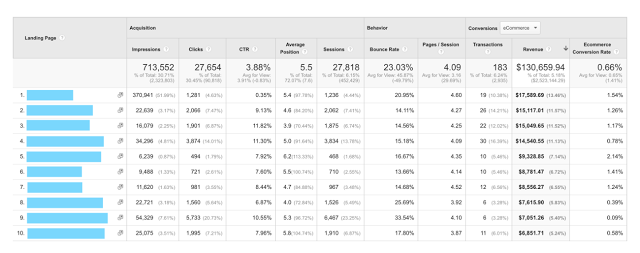Winning in the Age of AI Search: How Brands Can Thrive as Search Evolves
Search is changing faster than ever. With the rise of AI-powered features like Google’s AI Overviews and AI Mode, the familiar “10 blue links” are...
Read moreDr. Dave Chaffey welcomes the new changes to reporting in Google's Search Console, and explains what this means for SEOs wanting a clearer picture of their site's performance.
If you think back several years, we used to take the insight that Google and other search engines provided for granted. We could readily compare the contribution of paid and search on clicks and conversion side-by-side, broken down by keyword. This made it easy to perform an SEO gap analysis showing opportunities for improvement.
Then, more than three years ago, Google stopped reporting on keywords from organic search when it started blocking reporting of encrypted search terms, labelling keywords as the opaque 'not provided'. Before long, more than 80% of search keywords were encrypted meaning that this type of gap analysis was impossible.
Hands-on SEOs will know that since then, Google has taken some steps to give back what has been taken away. A keyword reporting tool was added to Google Webmaster Tools (now the Search Console) and this could be integrated with Google Analytics by site owners.
When completing audits of analytics for businesses I still find that many businesses don't take advantage of this, so if they were looking at the effectiveness of their SEO, most keywords would be reported as 'not-provided'.
While the new tool has some BIG limitations such as a 90-day reporting window and a limit to the top 1,000 keywords, it's certainly helpful to perform a basic gap analysis of the number of search impressions (searches performed) against the clicks you get through to the website for the keywords you are targeting.
This month, there has been an update to this keyword analytics tool which I wanted to alert you to. Google explained on their analytics blog that you can now get information on the quality of keywords such as bounce and conversion rates .
These are the new columns you can get data can - or will be able to when it rolls out.

Note that previously, this data was accessed from the 'Search Engine Optimisation' menu available in Google Analytics in the Acquisition section. It has now changed to the less clear 'Search Console' option which does have the benefit that the need for integration is clearer. This feature is 'coming real soon now', however, I'm not not seeing this feature yet.
Check it out! Whether you are using the tool already or not, it's an essential tool given the importance of SEO and how you should integrate it with Google AdWords.
Data is provided at a landing page level giving other insights too. Google explains that:
Each of these new reports will display how your organic search traffic performs. As data is joined at the landing page level, Landing Pages, Countries and Devices will show both Search Console and Google Analytics data, while the Queries report will only show Search Console data for individual queries.
Here is an example of what you will be able to see from Google's announcement post, with landing pages anonymised on the left.

There are now additional ways you break out the success of your organic search data too, for example by country and mobile device types.
So, it's good news for SEOs who now get back some insight which was lost three years ago when Google stopped reporting on keywords from organic search.
More articles you might be interested in:

Search is changing faster than ever. With the rise of AI-powered features like Google’s AI Overviews and AI Mode, the familiar “10 blue links” are...
Read more


Arming yourself with the right tools to ensure a smooth site migration is important - find out how to protect your SEO during a migration today.
Read more
Google employees have recently announced that the upcoming Google Core Update is set to be released in the coming weeks. Understanding and addressing...
Read more
Language matters. Any marketer worth their salt knows this. But when discussing gender and sexual orientation, that importance is amplified tenfold.
Read more
When marketers think of thought leadership, there are names rather than ideas, that tend to spring to mind.
Read more
As Google turns 25, we’re taking a look back at our favourite Google moments. Which features have made the biggest impact on digital marketing on...
Read more